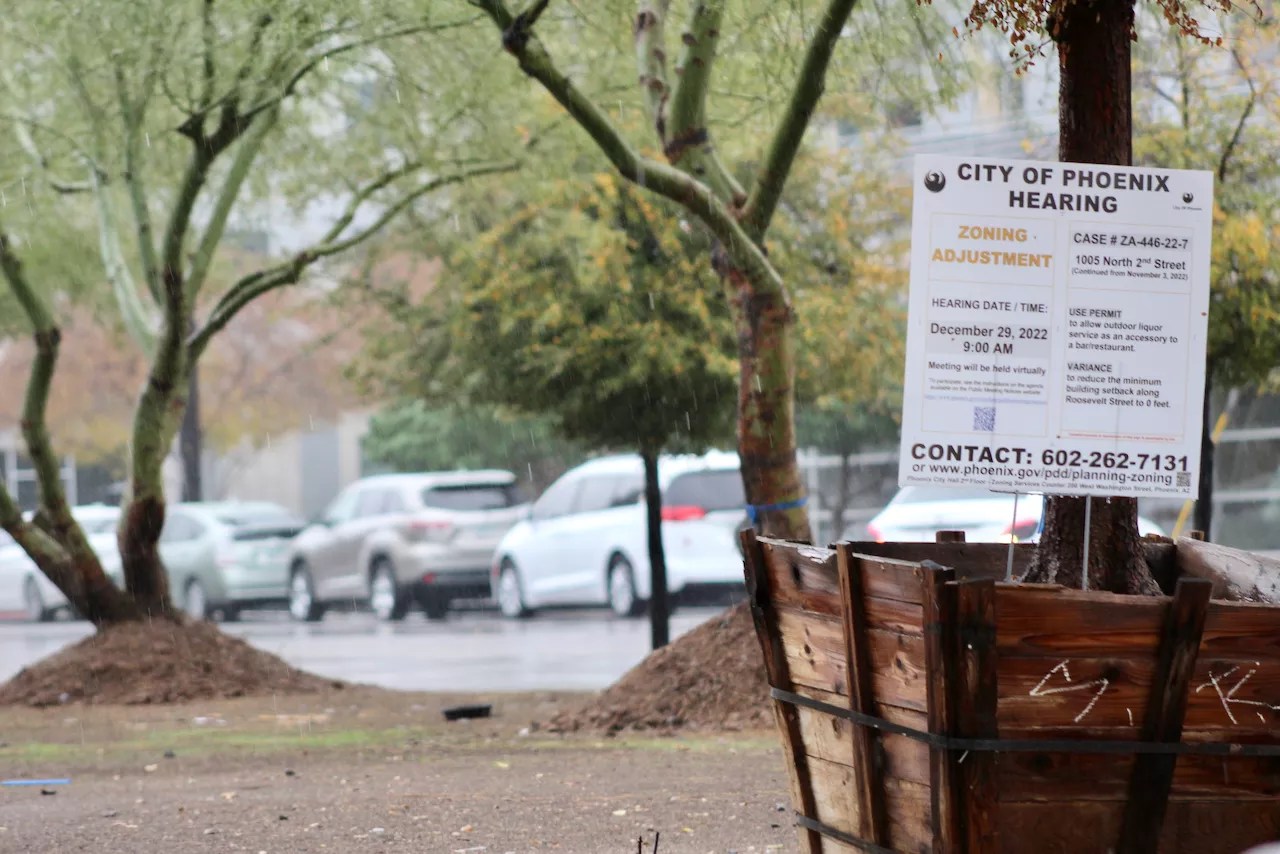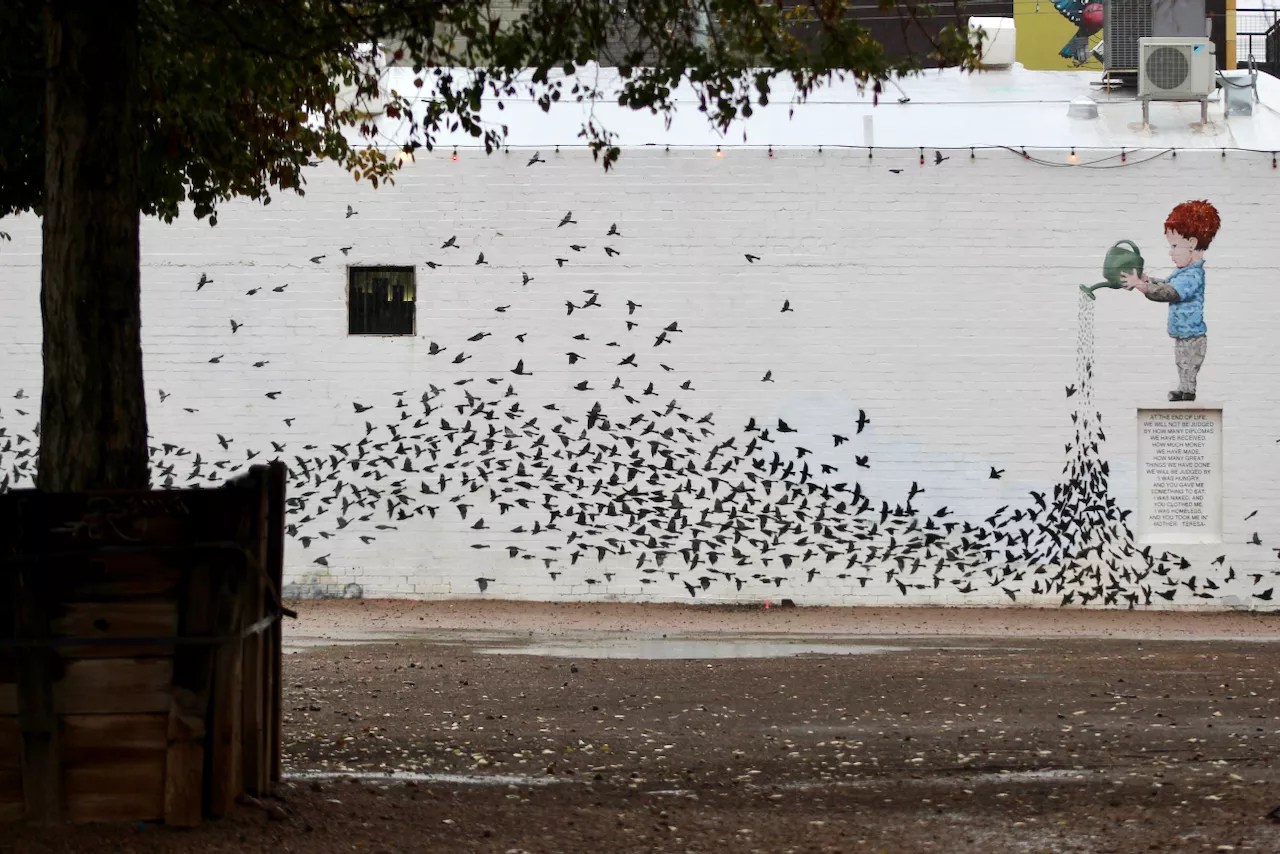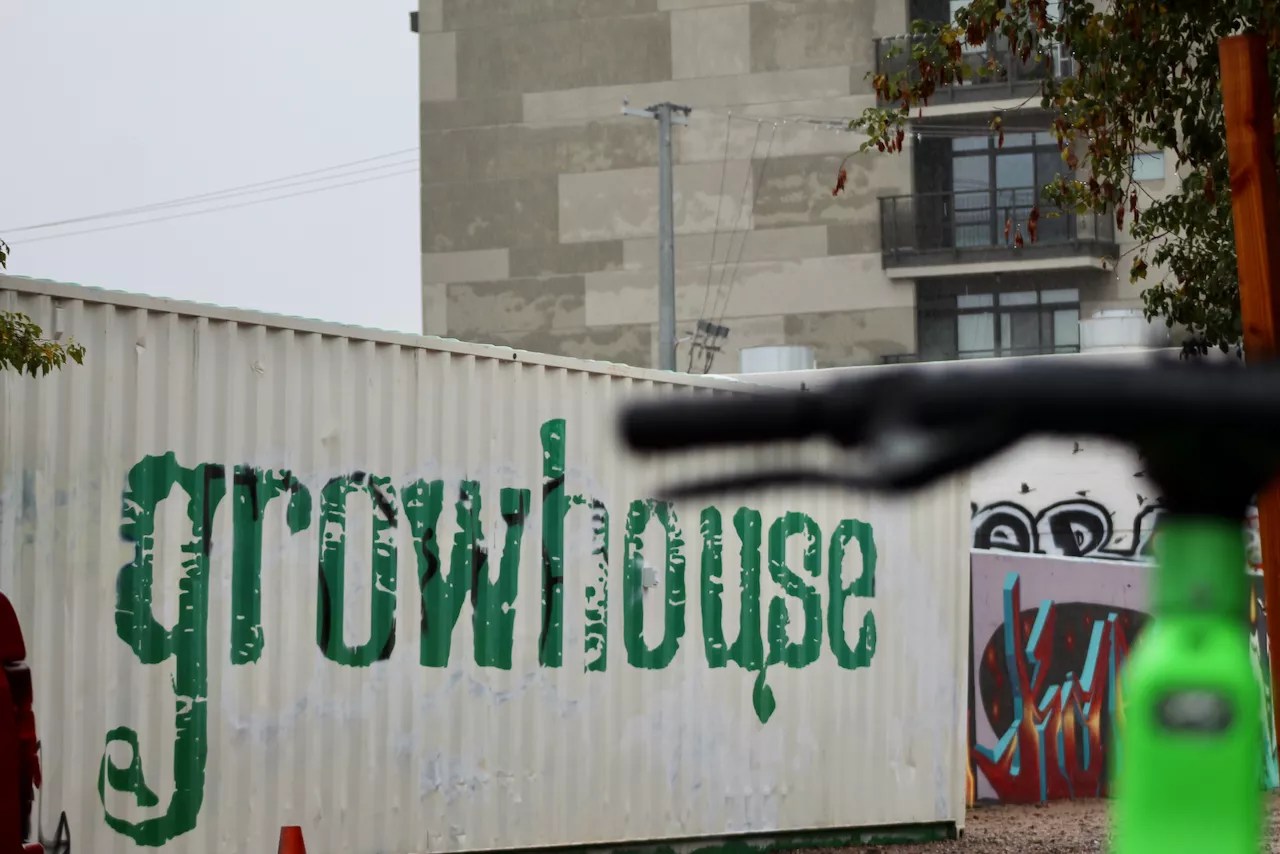
Elias Weiss

Audio By Carbonatix
A shipping container model home exhibition on Roosevelt Row, funded with $1.2 million in public funds, will eventually be used to house unsheltered people in Phoenix. But first, it will help a private corporation make a buck.
Local housing experts are mixed on whether the new project will catapult large-scale development of quick-occupancy modular homes as well as on the impact a private developer that prides itself on “exquisite downtown Phoenix living” can have on low-income families in need of affordable housing.
In late January, five model homes built from shipping containers will be installed along flourishing Roosevelt Row in downtown Phoenix. The city-owned land near Second and Roosevelt streets has sat unoccupied for more than 15 years, save for a short-lived temporary parking project in 2016. But in a matter of weeks, Phoenix-based metal fabricator Steel + Spark will unveil the exhibition and offer daily tours in an effort to sell more homes to customers and raise awareness about sustainable living.
The shipping container homes, which the developer calls SparkBoxes, can be used for many purposes, including as accessory dwelling units, single-family housing, and transitional housing for the unsheltered.
The project is funded with a $1.2 million grant from the Arizona Department of Housing. The grant is part of $60 million the state legislature appropriated to the Housing Trust Fund in 2022, according to the housing department.
“This is a local company with an excellent track record of developing innovative container housing,” Dave Cherry, a spokesperson for the state housing department, told Phoenix New Times.
The Roosevelt Row project will feature two studio apartments and three one-bedroom apartments, each fully furnished and self-powered with rooftop solar panels. The units will be staged with boxed plants and outdoor entertainment space.
“Our hope is to demonstrate an innovative sustainable smart solution to increase housing quickly,” said Brian Stark, who along with Kathleen Santin co-owns both Steel + Spark and Local Studio, a container home developer in Phoenix. “We hope to spread awareness and help advance the legislation and zoning ordinances to expedite this type of housing.”
The grant is part of at least $4.2 million in public funds Steel + Spark has received in recent months. In December, the Phoenix City Council approved a $3 million contract for the company to install four refurbished 40-foot shipping containers that will house up to 20 people as part of a larger development in southwest Phoenix to provide housing for homeless people, according to city documents and the Arizona Republic.

Shipping container homes from Steel + Spark will soon fill this lot near Roosevelt Row.
Elias Weiss
Container No-Brainer?
The exhibition will be on display until June. Then, the model homes will be moved to an undisclosed location in the Valley where they will serve as housing for unsheltered people.
“We’re still in discussion about where the units will go, but they will be used for housing the homeless,” Cherry said. “With the extreme statewide housing shortage, ADOH has prioritized quick-occupancy, sustainable solutions for housing.”
But the need isn’t just for housing units in general – it’s for affordable housing units. Arizona ranks in the bottom five among all states for affordable housing, according to an April 2022 study from the National Low Income Housing Coalition. For every 100 low-income families in the state, just 26 affordable home options are available, according to the study.
The company hasn’t announced the selling price of the units. But Stark’s most recent venture, IDA on McKinley, offered monthly rental rates for more basic one-bedroom container apartments starting at $1,700 when it opened earlier this year.
Assuming the standard that rent shouldn’t exceed one-third of a person’s income, a renter would need an annual salary of at least $61,200 per year to afford $1,700 a month in rent. That’s double Arizona’s median income, according to the U.S. Census Bureau.
After rents in metro Phoenix shot up 30 percent in 2021, the Arizona Department of Housing says 270,000 new housing units are needed to meet demand. The Steel + Spark project on Roosevelt Row will provide five units, each with the capacity to house one or two people.
“Our hope is to encourage the use of quick-occupancy container housing statewide for all types of uses, both affordable and market rate,” Cherry said. “If this demonstration is successful, we anticipate seeing many other container and modular companies making use of the exposure to grow their business and provide many of the thousands of housing units needed across the state.”
But Stephen Deubel, host of the local container living radio show Boxcar Universe and a container homes expert for ABC 15’s Sonoran Living, isn’t sure he buys the premise. Deubel has worked on government-funded housing projects in Arizona and has been designing, developing, and discussing container homes in Phoenix for 17 years.
“This will bring a lot of focus on container home building, there’s no doubt about that,” Deubel told New Times. “Whether or not that will spur other investors to get government-funded loans to be able to do that is questionable.”

The developers of IDA on McKinley are also the ones installing demonstration container homes along Roosevelt Row.
William LeGoullon
Return on Investment
Elizabeth Venable, co-founder of the Phoenix homeless advocacy group Fund for Empowerment, remembers renting an apartment in Roosevelt Row in the early 2000s for $425 per month. Today, the average rent in that neighborhood is $1,732 for a studio and $1,927 for a one-bedroom.
“It’s a shame that they would spend this type of money for so little return,” Venable told New Times. The project, she said, “will not be sufficient to cover the amount of housing that could have been paid for. Other projects are in much greater need, rather than filling in model home advertisements, which later get turned into a small number of units.”
With the $1.2 million grant funding five containers, that means roughly $240,000 per unit. But the average container home costs between $10,000 and $35,000 to build. Deubel said he was floored when he learned the grant would create just five bedrooms.
“The price surprises me. I’m sure there will be some other infrastructure that has to be done, too, but the dollar figure seems to be a little high,” he said. “They’re getting all this money for what seems to not be something of that much value.”
Steel + Spark is incorporating new technology in this project, including incinerating toilets, real off-grid energy storage, high-efficiency air conditioning, a grey water treatment system, and a water filtration system. “Incorporating all of these items into a prefab unit that drops in your backyard ready to go takes a lot of research, development, investment, and time,” Stark said.
He noted that a small portion of the grant would fund operation of a park and educational materials.

The developers of the container home pilot project hope to maximize exposure thanks to the upcoming Super Bowl.
Elias Weiss
‘Maximum Exposure’
In early February, Super Bowl 57 will draw an estimated 100,000 people to roam the streets of Phoenix as they participate in football-related merrymaking. The developers of the Roosevelt Row container project hope to take full advantage of the increased crowds.
“Their proposal for this demonstration during the Super Bowl provided maximum exposure to increase awareness of the possibilities for this kind of housing,” Cherry said.
A primary purpose of the installment, however, is to attract customers who can join a waitlist to buy container homes for an unspecified price. Even out-of-towners are welcome to make a purchase since the prefab homes can be transported and crane-dropped just about anywhere, Santin said.
Steel + Spark is paying the city of Phoenix a licensing fee to place the containers on the Roosevelt Row property, according to city records. The fee will be deposited into the city’s Downtown Community Reinvestment Fund, which pays for landscaping and other upgrades in downtown. After June 2023, the license will become invalid.
Stark said he hopes to collaborate with government agencies and other interested parties on similar projects that may have a larger and more direct impact on unsheltered people in Phoenix.
“We are willing to continue the work of pushing innovative housing no matter who we partner with,” he said.
Cherry added that the use of container homes to assist the unsheltered could grow beyond Phoenix.
“We expect to see more of this type of non-congregate shelter housing in other jurisdictions to house the growing population of homeless throughout the state,” he said.